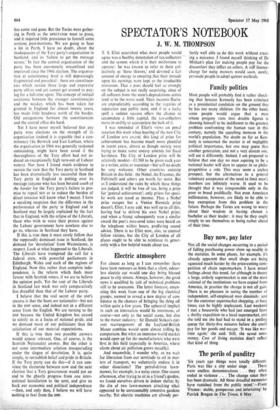SPECTATOR'S NOTEBOOK
J. W. M. THOMPSON
I was reminded of Eliot's views on penal taxation this week when hearing of the new City of London arts award; this kind of prize for achievement has become much more plentiful in recent years, almost as though society were trying to make some uneasy amends for fiscal harshness. The City of London prize will be relatively modest—£1,500 to be given each year to a writer, artist or musician—but will no doubt be very welcome. Other countries outstrip Britain in this field : the Nobel, the Erasmus, the Feltrinelli and others are worth far more. But as'I understand the rules by which these things are judged, it will be free of tax, being a prize for 'general achievement'; only prizes for speci- fic work are taxed as income. Thus a Nobel prize escapes but a Venice Biennale prize doesn't. Eliot, 1 may add, was well up in all this, having had to defend his own Nobel prize; and when a friend subsequently won a similar award the poet's measured tones were heard on the telephone within hours, proffering sound advice. There is no Eliot now, alas, to counsel fellow victims, but the City of London of all places ought to be able to reinforce its gener- osity with a few helpful words-about tax.
Electric atmosphere
For almost as long as I can remember there have been rumours or hints that a silent, odour- less electric car would one day bring blessed peace to city streets. Always, however, the good news is qualified by talk of technical problems still to be overcome. The latest forecast, eman- ating this week from one of the big electrical groups, seemed to reveal a new degree of con- fidence in the chances of bringing the thing off within quite a few years. The upheaval implicit in such an innovation would be enormous, of course—not only to the social scene, but also to the motor industry : Sir Donald Stokes's cur- rent rearrangement of the Leyland-British Motor combine would seem almost trifling by comparison. But what an immense world market would open up for the manufacturers who were first in this field (especially in America, where alarm about air pollution grows steadily).
And meanwhile, I wonder why, as we wait for liberation from our servitude to oil in mat- ters of transport, we voluntarily endure it in other directions? The petrol-driVen lawn- mower, for example, is a noisy curse. One recent afternoon, after trying to sit in a friend's garden, we found ourselves driven to indoor shelter by the din of two lawn-mowers attacking what appeared to be unreasonably extensive gardens nearby. Yet electric machines are already per-
fectly well able to do this work without creat- ing a nuisance. I found myself thinking of Dr Mishan's plan for making people pay for the discomfort they inflict on others. A stiff licence- charge for noisy mowers would soon, surely, persuade people to adopt quieter methods.
Family politics
Most people will probably find it rather shock- ing that Senator Kennedy has been criticised as a presidential candidate on the ground that he has too many children. On the other hand, some people would argue that a man
whose progeny runs into double figures is showing himself to be indifferent to the greatest problem confronting the human race in this century, namely the appalling increase in the world's- population. No doubt so far as Ken- nedy is concerned the matter is of negligible political importance, but one may guess that another generation, and not a very distant one, will see it differently. Indeed, I am prepared to believe that one day no man aspiring to be a national leader will dare to appear in so philo- progenitive a role. This may seem a joyless prospect, but the alternatives to a general voluntary acceptance of the need to limit man's numbers are infinitely worse. It used to be thought that it was irresponsible only in the poor to breed prolifically. Not even American millionaires, however, are likely to be able to buy exemption from this problem in the future. Perhaps the Tories are wrong to worry about their wisdom in • having chosen a bachelor as their leader: it may be they ought simply to see themselves as being rather ahead of their time.
Buy now, pay later
Not all the social changes occurring in a period of falling purchasing power show up readily in the statistics. In some places, for example, it's already apparent that small shops are being squeezed much harder by the price-cutting com- petition of chain supermarkets. I have mixed feelings about this trend, for although in theory a large, orderly supermarket is one of the most rational of the institutions we have copied from America, in practice the change is not all gain. There is no pleasure in seeing the number of independent, self-employed men diminish : and for the customer supermarket shopping. at busy times, can be highly unpleasant. Last weekend I met a housewife who had just emerged from a thrifty expedition to a local supermarket, and she told me she had had to stand in a jostling queue' for thirty-five minutes before she could pay for her goods and escape. 'It was like war- time again,' she said. Still, she saved some money. Cost of living statistics don't reflect that kind of thing.
The perils of punditry
'Six years ago things were totally different. Paris was like a city under siege . . There were endless demonstrations . . . they often ended in violence . . . The change since then has been dramatic. All those dreadful memories have vanished from the public mind.'—From 'France : stable, prosperous and infuriating' by Patrick Brogan in The Times, 6 May.






































 Previous page
Previous page